Organic Waste... there is a better way!
Organic Waste... the better way!
The BioMass Recovery (BMR) Technology

The well-proven rotary BioDigester is at the core of the BMR Technology…
Input: Organic Waste (Agri, Food, etc.)
Output: Sterile BioMass, BioFertilizer, (BioChar)
Input: Organic Waste (Agri, Food, etc.)
- Aerobic 3 to 5-day cycle
- Exothermic ~ 60°C (140°F) *
- Kills pathogens, weed-seed, etc.
- Low investment / operation cost
- No odours, emissions, leachate
- Plastic packaging, etc. easily separated
- Carbon Negative process
Output: Sterile BioMass, BioFertilizer, (BioChar)

High-quality BioMass from Organic Waste
Nutrient-rich BioFertilizer
The Dairy Farm BioDigester System
Dairy farms can replace hay, sawdust and shavings with recycled manure as bedding for their cows, at costs far lower than previously available in systems utilizing similar science.
Here’s how it works…
Organic waste in the form of scraped, and/or, dewatered flush manure, is fed into a mixer to form the ideal feedstock, which is made up of manure solids at 35% dry matter, along with waste crops, plus food and other 'green' waste, which in turn can generate new revenues from 'Gate Fees'.
The advantage of composting manure solids is that the aerobic bacteria, which breakdown the organic matter, are already in the solids, courtesy of the cows. Once in the BioDigester, the bugs proliferate as they finish the job they began in the cows’ stomachs.
A custom designed blower pulls air through the BioDigester ensuring an ample air supply that blends with the solids tumbling from the rotation of the unit. Within just a few hours, the enhanced aerobic activity of the bacteria has brought the temperature to around 60°C (140°F)*, where it stays as the material makes its way through the BioDigester.
*US regulations for pathogen kill in compost requires >130°F (54.4°C) for 3 days.
Dairy farms can replace hay, sawdust and shavings with recycled manure as bedding for their cows, at costs far lower than previously available in systems utilizing similar science.
Here’s how it works…
Organic waste in the form of scraped, and/or, dewatered flush manure, is fed into a mixer to form the ideal feedstock, which is made up of manure solids at 35% dry matter, along with waste crops, plus food and other 'green' waste, which in turn can generate new revenues from 'Gate Fees'.
The advantage of composting manure solids is that the aerobic bacteria, which breakdown the organic matter, are already in the solids, courtesy of the cows. Once in the BioDigester, the bugs proliferate as they finish the job they began in the cows’ stomachs.
A custom designed blower pulls air through the BioDigester ensuring an ample air supply that blends with the solids tumbling from the rotation of the unit. Within just a few hours, the enhanced aerobic activity of the bacteria has brought the temperature to around 60°C (140°F)*, where it stays as the material makes its way through the BioDigester.
*US regulations for pathogen kill in compost requires >130°F (54.4°C) for 3 days.

Why Aerobic Digestion?
- Robust well-proven system.
- Commercially sustainable.
- Far superior efficiencies.
- >70% less emissions.
- Lower Carbon Footprint.
- Protects water tables.
- More flexible feedstock.
- No residual waste for disposal.
- No odours, leachate, or toxic spillages.
- Heavily polluting Organic Waste diverted from landfill and incineration.
Advantages of Biofertilizers, over Chemical Fertilizers...
- Sustainability.
- Affordability.
- Improved soil.
- Improved plant growth and harvest.
- Eco Friendly - Land and Sea.
- No adverse effect on Plant Growth or Soil Fertility.
- Control and inhibit pathogenic Soil Bacteria.
- Increase beneficial Micro-Organisms in the root region.
- Reduce requirement on Chemical Fertilizers.
- Relatively easy to apply.
- Reduce need for Pesticide Sprays.
Net Zero Drivers
COP28...
The Emirates Declaration on Sustainable Agriculture, Resilient Food Systems and Climate Action was endorsed by 134 countries, which represent > 5.7 billion people and circa 500 million farmers, who produce 70% of the food they eat, and responsible for 76% of emissions from food systems, or 25% of total global emissions.
Extracting the organic fraction from waste streams provides for substantial Value Creation in the transition to Net Zero
- Carbon Accountability applies throughout the entire Food Supply Chain.
- Need for BioFertilizers to replace climate damaging chemical fertilizers.
- BioChar consumption is growing with increasing Organic Food production.
COP28...
The Emirates Declaration on Sustainable Agriculture, Resilient Food Systems and Climate Action was endorsed by 134 countries, which represent > 5.7 billion people and circa 500 million farmers, who produce 70% of the food they eat, and responsible for 76% of emissions from food systems, or 25% of total global emissions.
Extracting the organic fraction from waste streams provides for substantial Value Creation in the transition to Net Zero


